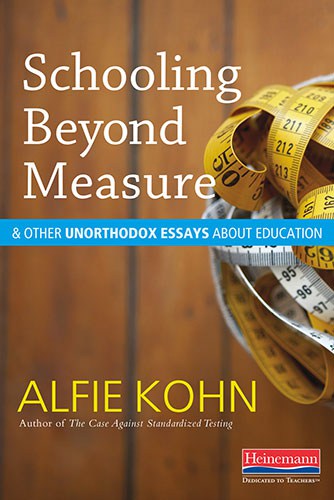Schooling Beyond Measure
And Other Unorthodox Essays About Education
(Heinemann, 2015)
 In this collection of provocative articles and blog posts originally published between 2010 and 2014, Alfie Kohn challenges the conventional wisdom about topics ranging from how low-income children are taught, to whether American schools have really fallen behind those in other countries. Why, he asks, do we assume learning can be reduced to numerical data? What leads us to believe that “standards-based” grading will eliminate the inherent limitations of marks? Or that training students to show more “grit” makes sense if the real trouble is with the tasks they’ve been given to do?
In this collection of provocative articles and blog posts originally published between 2010 and 2014, Alfie Kohn challenges the conventional wisdom about topics ranging from how low-income children are taught, to whether American schools have really fallen behind those in other countries. Why, he asks, do we assume learning can be reduced to numerical data? What leads us to believe that “standards-based” grading will eliminate the inherent limitations of marks? Or that training students to show more “grit” makes sense if the real trouble is with the tasks they’ve been given to do?
Kohn’s analytical style — incisive yet accessible — is brought to bear on big-picture policy issues as well as small-scale classroom interactions. He looks carefully at research about homework, play, the supposed benefits of practice, parent involvement in education, and summer learning loss — discovering in each case that what we’ve been led to believe doesn’t always match what the studies actually say. Kohn challenges us to reconsider the goals that underlie our methods, to explore the often troubling values that inform talk about everything from the disproportionate enthusiasm for STEM subjects to claims made for more “effective” teaching strategies.
During these dark days in which teachers are viewed as expendable test-prep technicians, and “global economic competitiveness” eclipses what children need, Kohn calls for us to summon the courage to act on what we already know makes sense.
Table of Contents
| One: How School Reform Undermines Education | |
| 1 | “We’re Number Umpteenth!”: The Myth of Lagging U.S. Schools |
| 2 | Competitiveness vs. Excellence |
| 3 | What Passes for School Reform |
| 4 | STEM Sell: Do Math & Science Matter More Than Other Subjects? |
| 5 | How to Sell Conservatism: Lesson 1 – Pretend You’re a Reformer |
| 6 | Operation Discourage Bright People from Wanting to Teach |
| 7 | Remember When We Had High Standards? Neither Do I |
| Two: Grades, Tests, And “Data” | |
| 8 | The Case Against Grades |
| 9 | Schooling Beyond Measure |
| 10 | Turning Children into Data: A Skeptic’s Guide to Assessment Programs |
| 11 | Whoever Said There’s No Such Thing as a Stupid Question Never Looked Carefully at a Standardized Test |
| 12 | Why the Best Teachers Don’t Give Tests |
| Three: In the Classroom | |
| 13 | A Dozen Essential Guidelines for Educators |
| 14 | What We Don’t Know About Our Students – And Why |
| 15 | The Trouble with Calls for Universal ‘High-Quality’ Pre-K |
| 16 | Poor Teaching for Poor Kids . . . in the Name of Reform |
| Four: What Kids Don’t Need | |
| 17 | Grit: A Skeptical Look at the Latest Educational Fad |
| 18 | What Waiting for a Second Marshmallow Doesn’t Prove |
| 19 | What Do Kids Really Learn from Failure? |
| 20 | Criticizing (Common Criticisms of) Praise |
| 21 | Five Not-So-Obvious Propositions About Play |
| Five: Misrepresenting the Research | |
| 22 | Homework: An Unnecessary Evil? |
| 23 | Do Tests Help Students Learn, or Was a New Study Misreported? |
| 24 | Studies Support Rewards and Traditional Teaching. Or Do They? |
| 25 | Lowering the Temperature on Claims of Summer Learning Loss |
| 26 | Is Parent Involvement in School Really Useful? |
| 27 | Perfect, It Turns Out, Is What Practice Doesn’t Make |
| Six: The Ends Behind the Means | |
| 28 | Teaching Strategies That Work! (Just Don’t Ask “Work to Do What?”) |
| 29 | “Ready to Learn” Means Easier to Educate |
| 30 | Just Another Brick in the Wall |
| 31 | What Parents Aren’t Asked in School Surveys – And Why |
| Seven: Making Change | |
| 32 | Change by Decree |
| 33 | Encouraging Courage |

